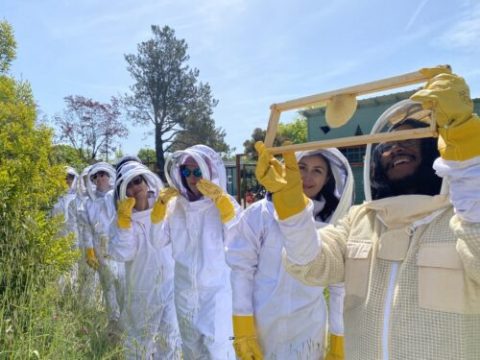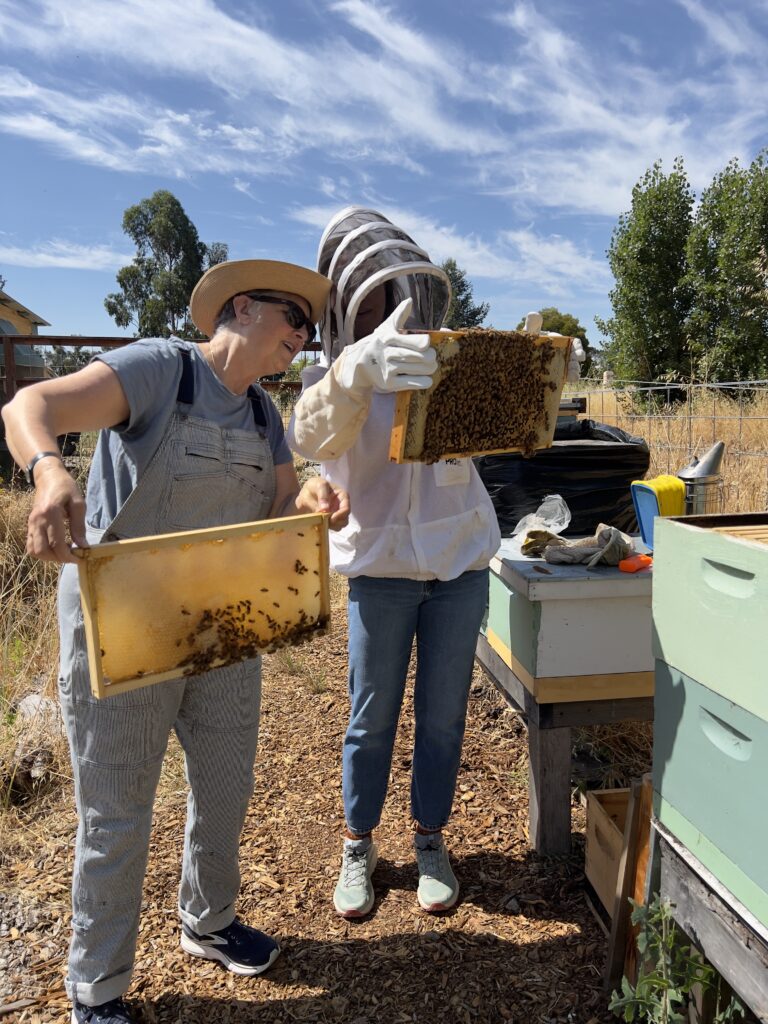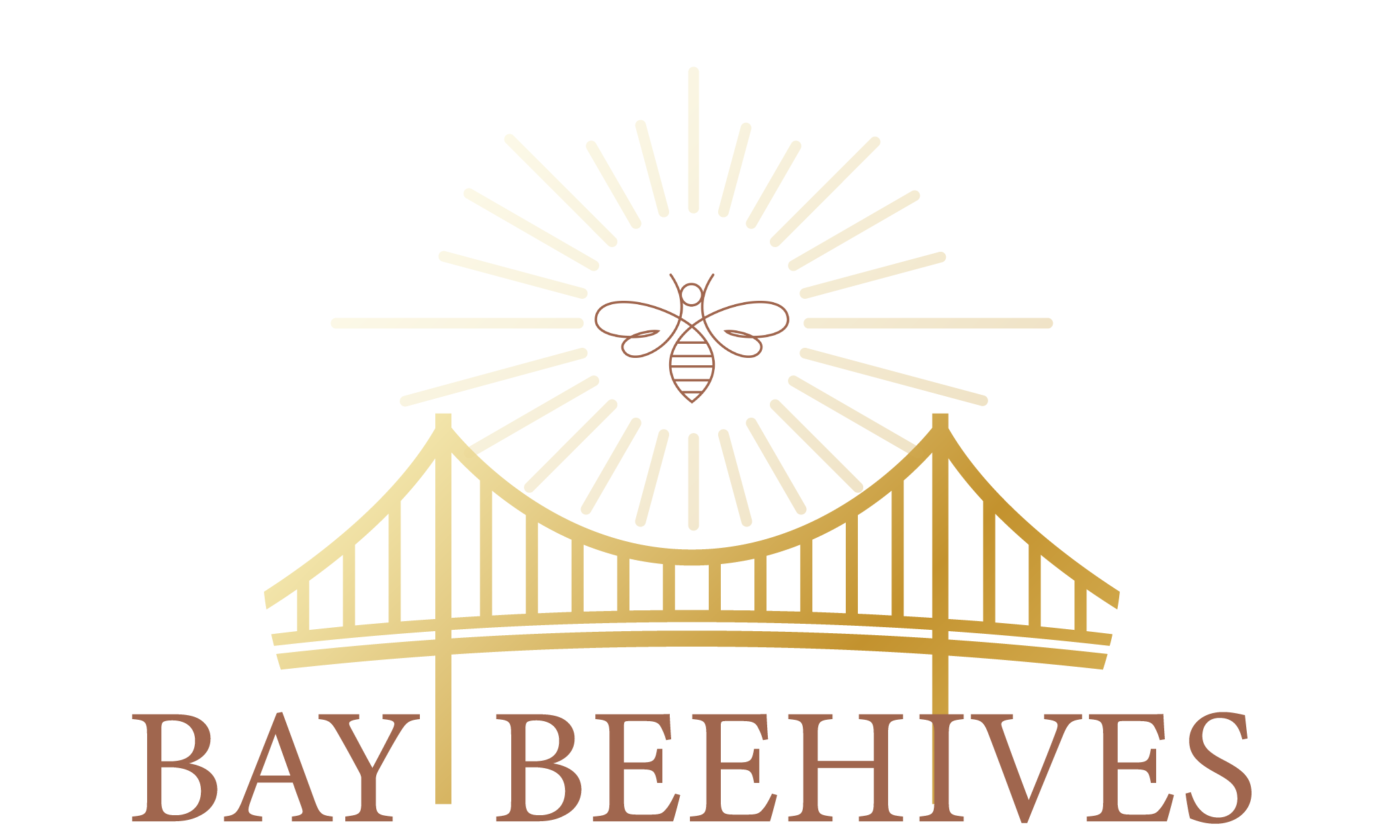IMMERSIVE + Educational
2024 SUSTAINABLE BEEKEEPING COURSE
Join US
Join us for an immersive learning experience tailored to make you a confident & capable beekeeper.
Are you fascinated by honey bees?
…considering having your own hive?
Whether your interested in producing your own honey or supporting your blossoming garden with pollinators, mentoring has long been the traditional method for experienced beekeepers to pass on the essentials of beekeeping to beginners. Bay Beehives upholds this time-honored tradition, ensuring new beekeepers a robust foundation in the art of tending bees.
We invite you to join us for an immersive learning experience tailored to make you a confident and capable beekeeper. No prerequisite knowledge is required. You can begin the course knowing absolutely nothing about bees and walk out ready to get started with your own backyard beehive!
In this 6 part course, we guide you through every step of becoming a beekeeper, from the installation of equipment and a nucleus colony, to providing a comprehensive Full Season of inspections, rooted in a natural approach to apiculture. Our focus spans sustainable hive management, honey production, and pollinator health.


Spring – Fall 2024
Session Times: Sessions typically run Saturdays, 9am – 5:30pm with a lunch break.
This course covers Beekeeping 101 to more advanced insights into bee biology and behavior. These hands-on lessons equip you with the skills to conduct thorough inspections, prepare for seasonal changes, responsibly harvest honey, and much more. It’s a practical, immersive learning experience.
If you’re thinking about starting a backyard beehive or are just curious about what’s involved with keeping bees, then this is a great introductory class for you. Can attend as a stand alone or part of the entire course.
The Introduction to Beekeeping class will include discussions on how to get started, different hive designs, how to build a langstroth hive, what tools to buy, how to place your hive, how to acquire bees, honey harvesting methods, and common hive pests. We’ll also cover city and state regulations, required time and financial commitment, installation of necessary equipment and hive inspection training. Plus, tons of practical information about how to prepare for the changing seasons, determine how much honey can be responsibly harvested and much more.
This is a lecture based class. No Suits required. All you need to bring is your sense of fun and adventure! Learn the fascinating inner workings of the hive and why bees are vital to the local and global ecosystem.
- Building equipment – hive boxes, frames and adding a natural beeswax
- Prepping used frames
Very early in spring, bees can sometimes run out of honey supplies before nectar is available. This puts them at risk of starvation, so it’s important to check stores early in the season. In this 1st inspection class we will look for:
- Queen or queen cells
- Evaluating honeyed pollen stores
- New brood
- Signs of disease or pests
- Record Keeping
Each session will build upon the last and you will become more comfortable identifying what you’ve already learned. During late spring and early summer, the nectar is flowing and bees are in full honey making mode. A booming hive population can lead to bees swarming at this time of year, so we will evaluate if we need to add additional hive boxes.
In this Inspection class we will look for
- Overcrowding – add hive boxes if the bees are running out of space
- Overheating – if wax inside the hive is melting or softening, you may need to offer hives shade
- Honey Bee nutrition and supplements
- Common pests and diseases
- Integrated pest management
By now you will have confidence in recognizing the types of bees, eggs, larva and brood stages. We may begin to see queen or “swarm cells.” In response to a booming hive, we may perform a “split” or creating a new hive from a current one. This is an advanced lesson.
At this time of year, we enter what’s called the “nectar dearth,” where nectar slows down and so does honey production. The bees can get a bit more protective of their resources. In building on from the previous month’s lessons, we will respond to the unique scenario of each hive. For beekeepers that treat for mites, one is often performed at this time,. We will go over the various risks vs rewards as well as types of treatments available. At this time we will begin to evaluate what’s needed for winter prep. Do they have enough food stores? Should we remove a box?
Our mission is to support pollinator health, our overall ecology and food supplies by providing sustainable hive management. We only harvest surplus honey from a hive, ensuring that the bees have ample stores to last them through the winter. We will evaluate what honey can be ethically sourced and extract it from the frames. We will also have a tasting of other locally sourced honeys to evaluate their unique flavor profiles. We’ll learn hands-on how to render beeswax for candles and salves and much more.
Tuition
We’re on a mission to nurture thriving habitats for both honey bees and native bees while spreading the joy and wisdom of beekeeping. Beyond the hive box, bees require nectar and pollen for their survival.
That’s why 5% of your enrollment investment will be used towards planting native plants and flowering trees at our partner, REAP Climate Center, ensuring an ample supply of vegetation to support each active honeybee hive we install.
Partner / Spouse Tuition: $550 (When one partner registers for the full course, the second gets a discount)
Teachers: $650 (Special price for For K-12, College and University Teachers)
Youth: $650 (Special price for ages 13-18)
Scholarships and Work trade Available for all income levels (See what’s available)
***Students who would like to start a hive at home will receive a 15% discount on nucs and hive equipment available for purchase – Please inquire early
FAQ's
We have extras of suits and protective gear equipment needed to take the course, but if you are serious about beekeeping, we recommend you purchase the following: (we have great recommendations on where to purchase depending on your budget):
- A beekeeping veil, suit or jacket
- Gloves
- Hive tool
- Smoker
Classes are held on our apiary at REAP Climate Center, our partner in climate action. Located at 2133 Tynan Ave,Alameda, California 95401. REAP is a playful half-mile-long campus and a blossoming regional hub for deploying nature as infrastructure.
All sessions are scheduled for Saturday, however, a safe time to open the hive is completely weather-dependent. If there is rain in the forecast or the temperatures will be less than 60℉, we will contact you by email 12-48 hours before the class to reschedule or cancel. Typically, we will schedule the rain check for the following day (Sunday).
If for some reason you are unable to join a scheduled inspection class, there will be an opportunity to make it up a different day.
- Gift certificates are available. Contact Us if you’d like to purchase one.
- Can’t make the date you signed up for? Read our cancellation policy in the FAQ section.
- Limited Space please enroll early
- Signed waivers are required to participate.
What You'll Learn
- Different types of beekeeping equipment and various honeybee genetics (choosing the right one for you)
- Understanding bee biology and behavior and the various roles the bees fulfill on their lifetime
- How to recognize the types of bees in a colony: queen, worker and drone
- Understanding the various medicinal products of the hive: honey, propolis, pollen and wax
- Seasonal hive care and proper inspections
- Recognizing signs of swarms, queen and overall hive health
- How to identify types of pests and how to eliminate them
- How and when to responsibly harvest honey
- How to render wax for candles and salves
- Advanced lessons of how to “split” a hive to create a new one
- Others lessons on best native plants to support our pollinators, swarm catching, history of beekeeping across various cultures, honey tasting and recognizing distinct varietals and flavor profiles and much more!
